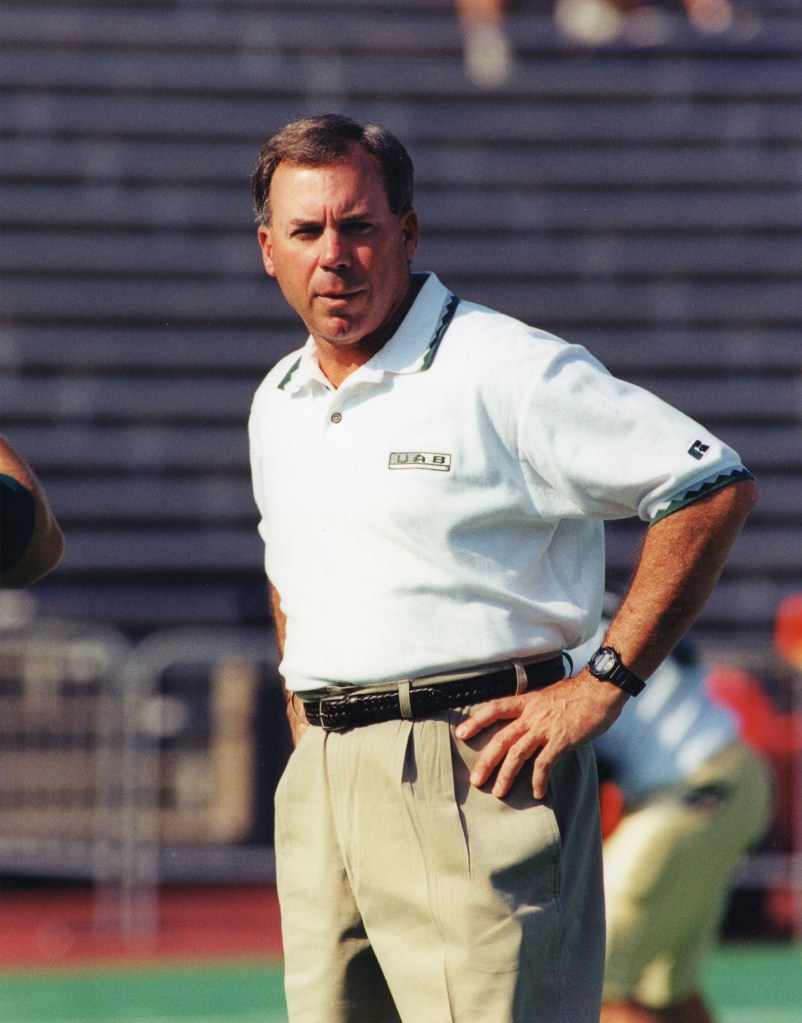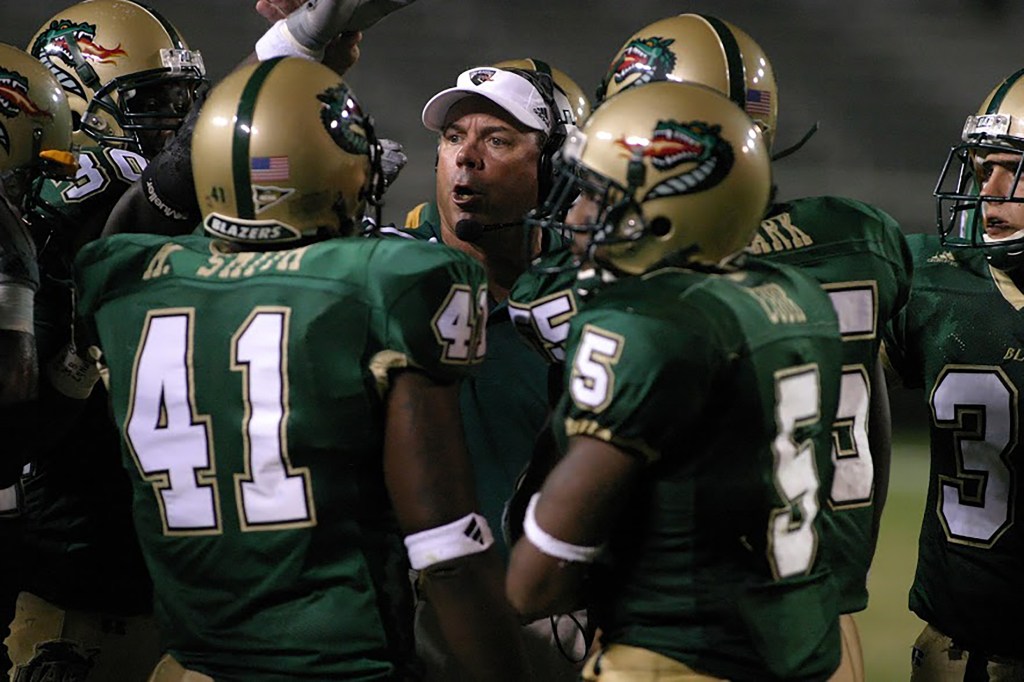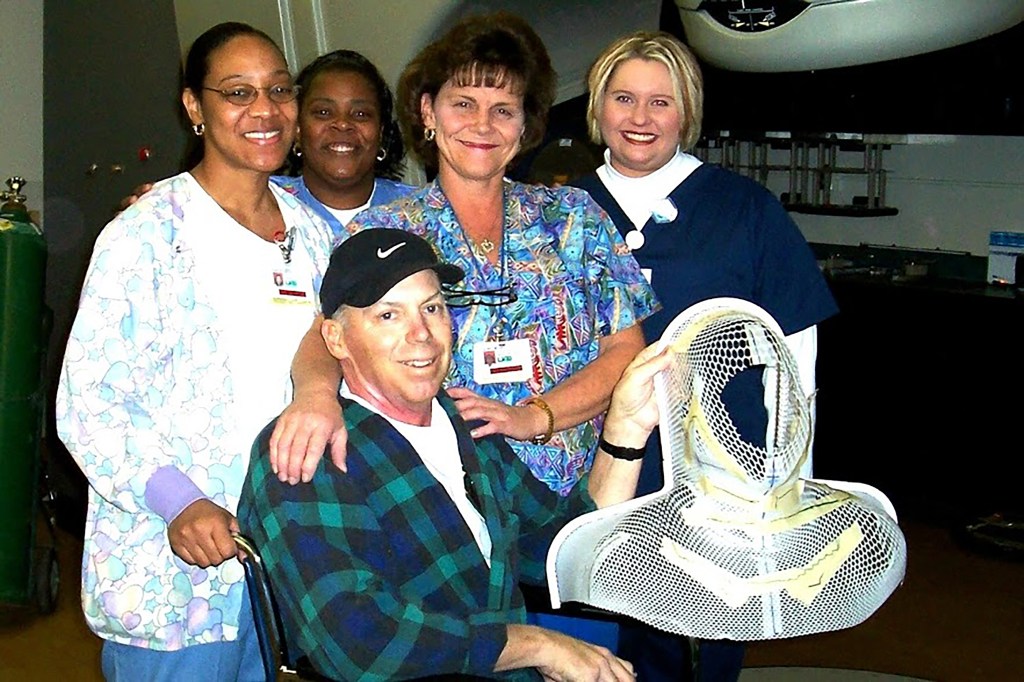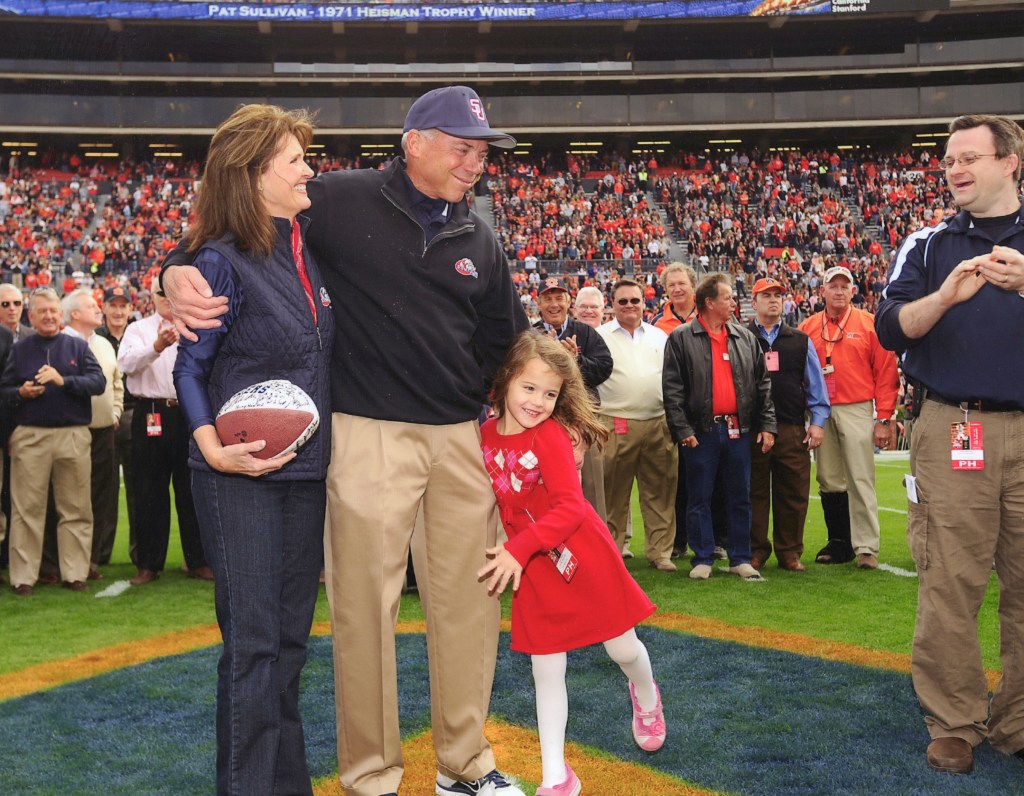Coaching Cancer Patients Beyond Treatment
Story by Kendra Carter | Photos courtesy of Samford University, Auburn University and Jean Sullivan

Pat Sullivan was a legendary quarterback and Heisman Trophy winner at Auburn University before a six-year NFL career. He later became a celebrated football coach at Auburn, Texas Christian University, the University of Alabama at Birmingham and Samford University. While coaching at UAB, Coach Sullivan was diagnosed with throat cancer in 2003. Today, he still deals daily with the side effects from the cancer treatment that he received 16 years ago.
Pat and Jean Sullivan understand too well that cancer care doesn’t end when the treatment does.
“Though we knew every form of treatment had side effects,” says Jean Sullivan, Coach Sullivan’s wife of 50 years, “at diagnosis, we didn’t know the extent of the many long-term issues or their progressive nature.”
The UAB O’Neal Comprehensive Cancer Center wants to help head and neck cancer patients like Coach Sullivan have a better quality of life during and after treatment. As a result, with help from the Sullivans, UAB will launch the Pat and Jean Sullivan Comprehensive Head and Neck Cancer Survivor Care Program early next year — the first effort of its kind in the country.
“Head and neck cancers are particularly difficult for patients to go through because of the cancer itself and its treatments can have an impact on many different levels,” says William R. Carroll, M.D., the John S. Odess Endowed Chair in Otolaryngology, chair of the UAB Department of Otolaryngology and senior scientist in the O’Neal Comprehensive Cancer Center. “For many years, the Sullivan family has been passionate about the idea of UAB creating a program to help head and neck cancer patients live better lives post diagnosis and treatment. Pat and Jean have overcome a lot of challenges, and by sharing their experiences and ideas, we’ve created a program that can help make things better for many of our patients.”
Coach’s Cancer Diagnosis

Coach Sullivan was diagnosed with Stage IV squamous cell carcinoma, a form of cancer that begins in the cells that line the structures of the head and neck. He attributes his cancer diagnosis to using smokeless tobacco for more than 25 years. “Ironically, I gave up thishabit a month before I was diagnosed,” he said.
In 2003, prior to the UAB football season where he was offensive coordinator, Coach Sullivan was spending time with his family at the lake when he experienced an earache and swelling. “I was treated for swimmer’s ear with antibiotics. After about 10 days, I told Mike (Jones, UAB’s head athletic trainer at the time) the swelling hadn’t gone down.” At Jones’ insistence, Coach Sullivan went to see Carroll who detected a primary tumor inthe base of Sullivan’s tongue. The tumor was surgically biopsied which led to a cancer diagnosis. The treatment protocol for it included chemotherapy and radiation.
Coach Sullivan continued to work throughout the season while getting his treatment. “The chemo was difficult for him, but he still went to work regularly for practices, meetings and ball games,” says Jean Sullivan. “But when he had the radiation, it burned him up, causing him a lot of pain and swelling which required him to have a feeding tube.
“After several months, his throat and neck healed from treatment and he regained the ability to eat again. Pat had a great four or five months of eating pretty well before his throat started closing up again due to the progressive nature of his condition.” Numerous throat dilations and swallowing rehab efforts were beneficial for a while, but ultimately a permanent feeding tube was needed for Coach Sullivan to obtain the required nutrients. In addition to his swallowing struggles, he also has to deal with ongoing respiratory, mobility, orthopedic, neurological and vascular issues, and chronic pain.
Meeting Patient’s Needs
“Throughout Pat’s care, it has been apparent to us the need for a program that helps patients navigate the issues they will encounter and provides access to specialists needed to address those challenges,” says Jean Sullivan.
“Dr. Carroll as Pat’s surgeon is a wonderful person who has helped us tremendously. We know he cannot be everything to all people, therefore we are excited about a program that will provide a supportive care team to patients and their families.”
How the Program Works
Through the Sullivan Survivorship Program, a multidisciplinary team of cancer experts will provide comprehensive, state-of-the-art survivorship care for head and neck cancer survivors in Alabama, regardless of where they receive their primary treatment.

This team includes head and neck cancer experts Carroll; Susan D. McCammon, M.D.; John W. Poynor, Endowed Professor in Otolaryngology; Sharon Spencer, M.D.; Ruby Meredith Outstanding Clinician Endowed Chair in the Department of Radiation Oncology; Lisle Nabell, M.D., professor in the UAB Division of Hematology & Oncology; cancer survivorship expert Smita Bhatia, M.D., MPH, director of the UAB Institute for Cancer Outcomes and Survivorship; and survivorship clinical operations expert Wendy Landier, Ph.D., RN, CRNP, deputy director of the Institute for Cancer Outcomes and Survivorship.
Together, this team will use an anticipatory, risk-based approach for pre-habilitation prior to treatment, support during treatment, and enhance early detection and management of long-term complications.
Smita Bhatia, who is also associate director for Cancer Outcomes and Survivorship at the O’Neal Comprehensive Cancer Center and a world reknowned cancer survivorship expert at UAB, says patients will have an initial assessment within the first 2-4 weeks of diagnosis for the team to identify the patients’ potential needs, provide guidance and education, and develop a survivorship care plan. This plan specifically includes a pre-habilitation phase to identify anticipated issues based on the patient’s specific tumor and treatment plans and make referrals to other specialists who will provide support through treatment and into survivorship.
Bhatia says specialties across UAB have pledged their support of the program, to include supportive care, dentistry, ophthalmology, otolaryngology, speechpathology, pulmonary, cardiology, interventional radiology, nephrology, gastroenterology, endocrinology, dermatology, neurology, nutrition, physical medicine and rehabilitation, cancer survivorship, health education and promotion, social work and psychology.
Patients will have quarterly follow-ups during the first year of their diagnosis, followed by annual visits to provide long-term follow-up care. Long-term care includes screenings for therapy-related complications, education supporting their wellness and psychosocial assessments.
“We are passionate about optimizing our patients’quality of life,” Bhatia says. “When we started developing this program, we spent a lot of time thinking about the patients’ and caregivers’ journey from cancer diagnosis through treatment and beyond, and that perspective shaped how we structured this new survivorship program.”
The program, which is formally expected to launch in early 2020, will also create an infrastructure allowing UAB scientists to engage Alabama head and neck cancer survivors in research opportunities. This can lead to a better understanding of the causes of these cancers, the long-term effects from cancer treatments and ways health care providers can anticipate and treat these issues.
“As physicians, we have always focused on how we’re going to get rid of the cancer,” Carroll says. “With this new program, the team will be in place to know what’s ahead and able to say to our patients, ‘We’ve got you. We’re with you in this journey, and we’ll be with you throughout the entire process.’”
Carroll says that because of the comprehensive approach to the program, the team in the UAB O’Neal Cancer Center will be able to help patients immediately and will continue to grow to meet the needs of patients for years to come.
“We want the Sullivan Comprehensive Head and Neck Cancer Survivor Care Program to be the model for head and neck cancer survivorship programs in the country,” he says. “But it can be even more than that; it can be utilized for other cancer types as well. This is significant and impactful work we are doing here in Birmingham.”
Helping Survivors
Coach Pat and Jean Sullivan, who live in Vestavia Hills, spend much time with their three adult children — Patrick, Kelly and Kim — and eight grandchildren. But since his cancer diagnosis, they have both used their experiences to educate and encourage other cancer patients,caregivers and their families.
They feel incredibly honored that the UAB program will bear their names. “I’m excited that UAB wanted todevelop a program dedicated for head and neck cancer survivors and their caregivers, and to have one like this that’s truly the first of its kind in the country here in Birmingham is wonderful,” says Jean Sullivan. “My hope is that the program will provide a better quality of life by having experts help patients and their families find answers, navigate steps in their care plans and ensure they get the care they need.”
Coach Sullivan has been an inspiration ever since he stepped on the football field, and even now his selfless motivation to do good is evident in his desire to help others. “I don’t know how much it’s going to be able to affect my life,” he says, “but I can’t tell you how much it would mean to us to be able to help and encourage other people going through similar struggles.”
For more information about the Pat and Jean Sullivan Head and Neck Cancer Survivor Care Program or to learn how your gift can make an impact in this effort, please contact Lisa Roth at (205) 934-0930 or leroth@uabmc.edu.

Share a Memory of the O'Neal Cancer Center
If you’re a physician, nurse, researcher, trainee, staff member, administrator or volunteer at the UAB O’Neal Comprehensive Cancer Center, our communications team wants to know what you think is most interesting, pivotal, or noteworthy about the O’Neal Cancer Center’s last 50 years. Submit a memory in honor of the Cancer Center’s 50th anniversary, and we may share it in our social media channels!




